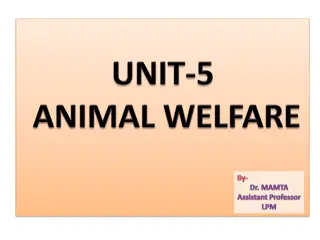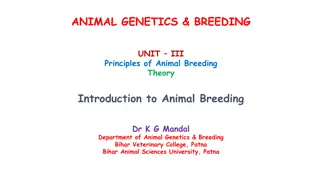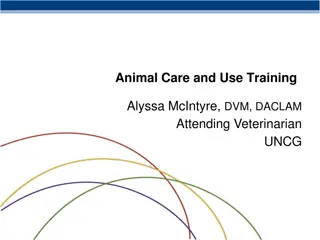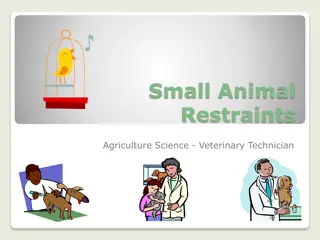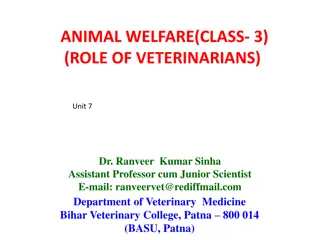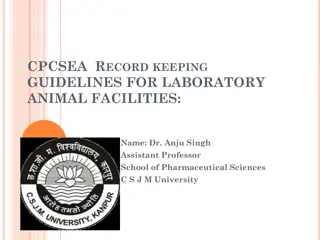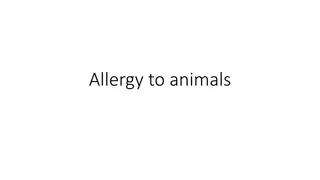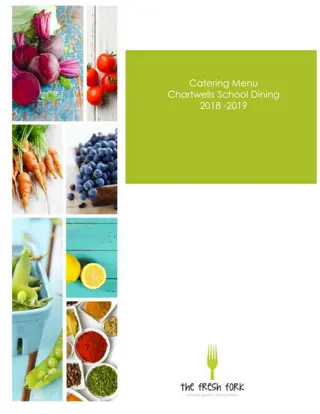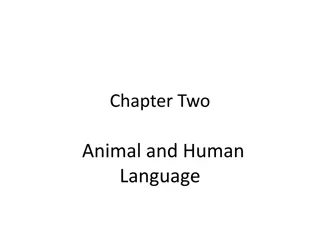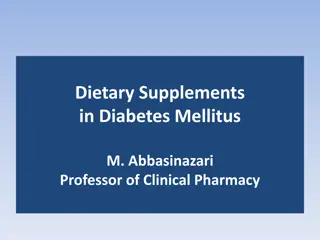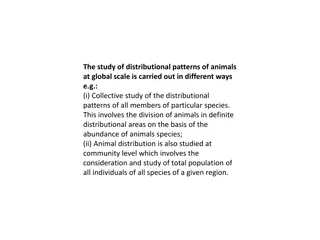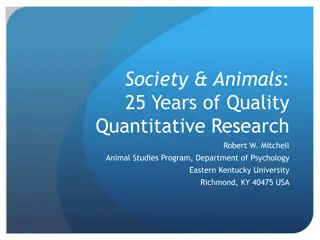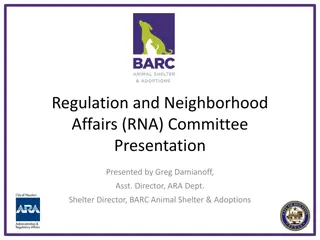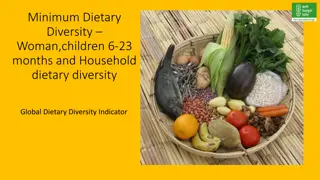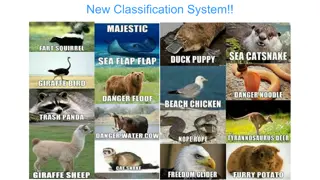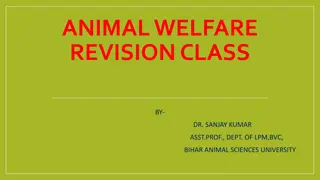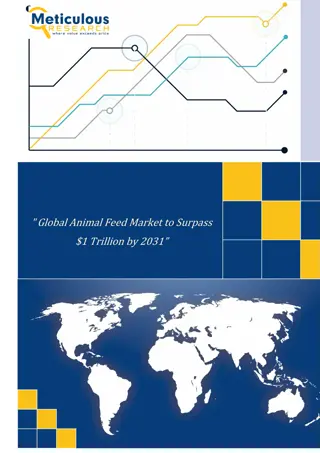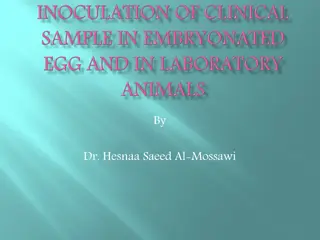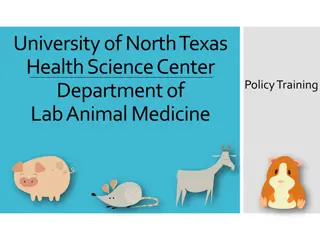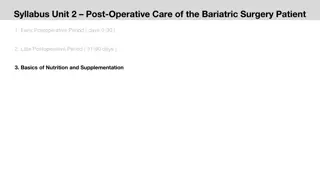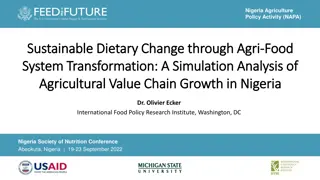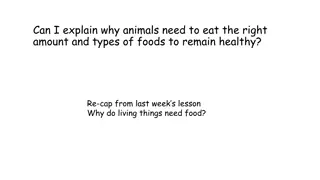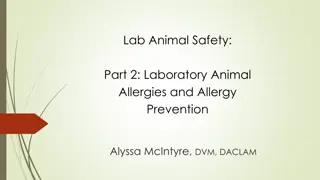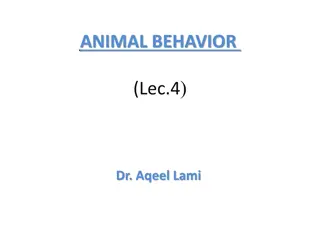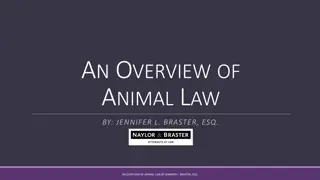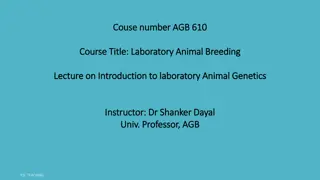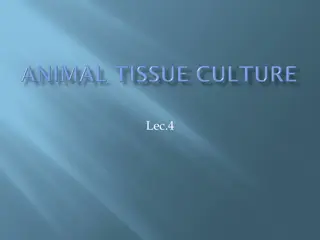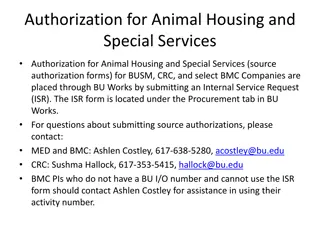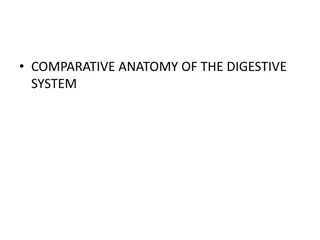History and Educational Programs of DEU Lab Animal Science Department
Established in 2004, the Department of Laboratory Animal Science at Dokuz Eylul University Institute of Health Sciences offers cutting-edge education focusing on animal welfare and ethical practices in scientific research. The department upholds the 3R Principle—Reduction, Refinement, Replacement�
0 views • 9 slides
Responsibilities of Facility Animal Care Committee at McGill University
The Facility Animal Care Committee (FACC) at McGill University oversees animal activities, ensures ethical treatment of animals, and adheres to guidelines from organizations such as the Canadian Council on Animal Care (CCAC). Responsibilities include continual oversight of animals, approving care pr
1 views • 13 slides
Feed Software Market is expected to reach $456.1 million by 2030
The growth of this market is attributed to the adoption of digital technologies and automation in the animal feed industry, the growing animal population, increasing demand for healthy animal-based food products, increasing animal health expenditure and pet insurance, and the growing need to reduce
0 views • 4 slides
Halal_Chicken_from_Brazil-_Ensuring_Quality_and_Authenticity[1]
In today's globalized marketplace, accessing high-quality halal chicken can sometimes pose a challenge. However, with Brazil emerging as a prominent supplier of halal poultry, consumers now have a reliable source for their dietary needs. Brazil is not only one of the world's largest exporters of chi
1 views • 2 slides
Animal Welfare and Ethics: Standards and Regulations in India
The content covers a wide range of topics related to animal welfare, ethics, and laws in India. It delves into the definition of animal welfare, the role of veterinarians, animal welfare organizations, regulations like the Prevention of Cruelty to Animals Act, and protection of wildlife, working ani
0 views • 15 slides
Principles of Animal Breeding: Introduction and Historical Perspective
This unit covers the introduction to animal breeding, the application of genetics principles in breeding, historical perspectives including the work of Robert Bakewell, and key events in animal breeding evolution. Topics include breeding systems, importance of animal breeding, and notable figures in
1 views • 12 slides
Importance of Training in Animal Care and Use for Research
Training in animal care and use is essential to ensure humane and appropriate treatment of research animals, promote regulatory compliance, and uphold high standards of science and animal well-being. The presentation covers the necessity of training, goals including reviewing animal use and identify
0 views • 53 slides
Small Animal Restraints and Safe Handling Practices in Veterinary Technology
Importance of safe practice when working with small animals includes preventing harm, reducing injury, and minimizing stress. Proper animal handling methods and tools are crucial for the safety of both animals and handlers. Common methods of handling different species, demonstrating appropriate anim
1 views • 22 slides
Understanding the Difference: Animal Rights vs. Animal Welfare
Explore the nuanced distinction between animal rights and animal welfare, delving into the ethical considerations, philosophies, and advocacy efforts surrounding these concepts. Discover how animal rights proponents emphasize the equal rights of animals, while animal welfare focuses on humane treatm
0 views • 36 slides
Role of Veterinarians in Animal Welfare
Veterinarians, especially with the increasing number of female professionals in the field, play a crucial role in promoting animal welfare through daily practices, advocacy, education, and research. They are involved in various sectors like biomedical, wildlife, and farm animal research, as well as
3 views • 10 slides
Exploring Animal Management and Sociology in Education
Discover the intersection of animal management and sociology in education through a comprehensive course structure that covers topics ranging from animal welfare and ethics to practical husbandry. Dive into the significance of animal care in the UK economy and learn about various career paths in thi
2 views • 19 slides
Laboratory Animal Facilities Record-keeping Guidelines
Guidelines for maintaining records in laboratory animal facilities include provisions for animal housing, staff records, health monitoring, and standard operating procedures. Compliance with CPCSEA regulations ensures ethical review procedures for animal research proposals. Focus is on providing a s
6 views • 11 slides
Understanding Allergies to Animals and Living Organisms
Allergies to animals and living organisms are a result of specific immune processes triggered by allergenic substances like proteins and peptides. This allergic response can be caused by various animal proteins such as dog allergens Can f.1, Can f.2, and Can f.3, and cat allergen Fel d1. The represe
1 views • 10 slides
Catering Menu: Start Your Day with Chartwells School Dining 2018-2019
Explore the diverse catering menu offered by Chartwells School Dining for the 2018-2019 academic year. From a variety of beverages to delicious breakfast options like bagel bars and fruit parfaits, this menu caters to various dietary preferences and needs. Enhance your dining experience with hot and
0 views • 19 slides
Uniqueness of Human Language and Communication Contrasted with Animal Communication
Human language possesses unique properties such as reflexivity, displacement, and arbitrariness, setting it apart from animal communication. These distinctions enable humans to communicate abstract concepts, discuss past and future events, and use arbitrary linguistic forms. The contrast between hum
1 views • 17 slides
Understanding Dietary Supplements in Diabetes Mellitus
Explore the role of dietary supplements in managing diabetes mellitus, covering principles, complementary medicine, functional foods, history, regulations, and the definition of dietary supplements. Learn about the benefits and considerations of using supplements as a part of diabetes management.
0 views • 63 slides
Understanding Global Animal Distribution Patterns
The study of animal distribution patterns at a global scale involves analyzing species abundance and diversity in specific areas. Factors like environmental conditions, latitudes, and evolutionary history influence animal distributions. There are horizontal and vertical zones of animal distribution,
1 views • 25 slides
Exploring Human-Animal Interactions through 25 Years of Quality Research
Delve into the interdisciplinary realm of human-animal interactions with a focus on social sciences and quantitative research. Discover key themes such as social psychology, therapy, animal welfare, and more. Explore attitudes and personality differences related to animal treatment, empathy, and bel
1 views • 26 slides
BARC Animal Enforcement Programs and Protocols
BARC Animal Enforcement is responsible for addressing dangerous, aggressive, and nuisance dog cases in the community. Through a structured priority matrix and enforcement tools, BARC aims to ensure public safety and animal welfare. The process involves investigation, designation determination, and c
0 views • 15 slides
Understanding Minimum Dietary Diversity for Women and Children
Explore the concept of Minimum Dietary Diversity for women and children aged 6-23 months, focusing on food group scores, indicator calculations, and the importance of consuming foods from various groups to meet nutrient needs. Learn about the key food groups, data collection methods, and the signifi
0 views • 12 slides
SASAS Strategic Plan Vision 2025 - Summary and Objectives
The SASAS Strategic Plan Vision 2025 aims to develop capacity in animal science to enhance animal production systems sustainably, promote welfare, job creation, and poverty alleviation. Informed by local, regional, and global imperatives, it aligns with the National Development Plan 2030, African Un
0 views • 11 slides
Exploring the Evolution of Animal Classification
Unveil the fascinating world of animal classification with a new system, delving into the definition of animals, informal groups, key events in animal evolution like symmetry and germ layers, embryological development of protostomes and deuterostomes, tissues formation, body cavity types, and cephal
0 views • 34 slides
Understanding Animal Welfare and Ethics in Veterinary Practice
Animal welfare is about ensuring the well-being of animals by providing proper care, treatment, and humane handling. It involves considering their physical and mental needs, preventing suffering, and promoting ethical treatment. Veterinarians play a crucial role in upholding animal welfare through d
0 views • 14 slides
Meeting Daily Dietary Fibre Needs with Oatmeal, Corn Kernels, and Lettuce
Learn how much oatmeal, corn kernels, and lettuce you should eat to meet your daily dietary fibre requirements, with detailed serving sizes and fibre content provided. The reference values emphasize the importance of consuming at least 25g of dietary fibre per day for optimal health.
0 views • 28 slides
Global Animal Feed Market to Surpass $1 Trillion by 2031,
Animal Feed Market Size, Share, Forecast, & Trends Analysis by Type (Compound Feed, Roughages), Source (Plant, Animal, Novel), Form (Dry (Pellets), Wet), Animal Type (Poultry, Ruminants (Beef, Dairy Cattle), Swine, Aquaculture) - Global Forecast to 2
0 views • 5 slides
Animal Systems in Virology: A Comprehensive Overview
The images and content highlight various aspects of utilizing animal systems in virology research, including procedures, recognition of illnesses, and the limitations of using animal models. It discusses the significance of animal systems in understanding viral infections and vaccine safety, as well
0 views • 16 slides
Guidelines and Policies for Lab Animal Facility Access and Management
The Department of Lab Animal Medicine at the University of North Texas Health Science Center outlines important policies and procedures for accessing and managing the lab animal facility. From training requirements to access protocols, this comprehensive guide emphasizes safety, security, and compli
0 views • 30 slides
Long-Term Dietary Management for Bariatric Surgery Patients
In the post-operative care of bariatric surgery patients, long-term dietary management plays a crucial role in ensuring successful weight loss maintenance. Factors such as motivation, willingness, and adherence to a healthy diet influence eating habits. Patients are advised on dietary progression, s
0 views • 10 slides
Nigeria Agriculture Policy Activity (NAPA) - Sustainable Dietary Change Through Agri-Food System Transformation
Nigeria faces a significant challenge with malnutrition, requiring sustainable dietary changes through agricultural value chain growth. The country's agri-food system needs urgent transformation to support healthier diets and environmental sustainability. Research aims to analyze how agricultural gr
0 views • 10 slides
Dental Dietary Counseling: Enhancing Oral Health Through Nutrition
Providing dietary counseling plays a crucial role in promoting oral health by educating patients on the impact of food choices on dental well-being. This involves identifying high-risk individuals, evaluating their diet, and creating personalized action plans to improve their dietary habits. Through
0 views • 47 slides
Understanding Animal Dietary Needs for Health
Animals require the right amount and types of foods to stay healthy. Different animal species have specific diets - herbivores eat plants, carnivores consume meat, and omnivores include both in their diet. Providing the correct food ensures proper growth, strength, and overall health. Giving animals
0 views • 8 slides
Importance of Calcium and Phosphorus in Animal Nutrition
Calcium and phosphorus are crucial minerals for animal health, with calcium being the most abundant mineral in the body. They play essential roles in nerve impulse transmission, muscle contraction, and bone structure. Deficiencies in these minerals can lead to conditions like rickets, osteomalacia,
0 views • 11 slides
Understanding Laboratory Animal Allergies and Prevention
Laboratory animal allergies pose a significant occupational hazard, with around 2 million workers at risk. Exposure routes include inhalation, skin contact, and ingestion. Factors such as pre-existing allergies, intensity of exposure, and secondhand exposure influence the likelihood of developing al
0 views • 30 slides
Insights into Animal Behavior and Hormones
Explore the fascinating world of animal behavior, from the deception of recognition mechanisms in gulls to Karl von Frisch's experiments on fish sensory abilities. Learn how behavioral assays shed light on animal sensory powers and how hormones play a crucial role in regulating animal behavior. Disc
0 views • 6 slides
A Comprehensive Overview of Animal Law by Jennifer L. Braster, Esq.
Explore the intricate realm of animal law through the eyes of Jennifer L. Braster, Esq. Delve into topics such as civil and criminal animal advocacy, dangerous dogs and municipality rights, transactional work with non-profits and family law, animal control ordinances, police dog shooting cases, and
0 views • 12 slides
Upgrading to TOPAZ Elements: Enhancing Animal Protocols, Orders, Census, and Billing
The Animal Resource Facility (ARF) and Office of Animal Care Compliance (OACC) are shifting to TOPAZ Elements, a comprehensive web-based system, to streamline management of animal protocols, orders, census, and billing. This upgrade aims to provide better oversight for PIs, enhance compliance with r
0 views • 8 slides
Understanding Laboratory Animal Genetics and Research Importance
This course (AGB 610) delves into the realm of laboratory animal breeding, exploring the significance of using animals in research and teaching. Dr Shanker Dayal, a distinguished professor, guides students through lectures on animal genetics and the common uses of laboratory animals. The course emph
0 views • 14 slides
Understanding Animal Tissue Culture and Cell Line Production
Animal tissue culture involves growing tissues separate from the animal in a laboratory setting. To achieve exponential cell growth, cells are converted into immortal cell lines. The production of a cell line involves steps like breaking cell adhesion, incubation, and transferring cells to fresh med
0 views • 22 slides
Authorization for Animal Housing and Special Services Process Guidelines
The guidelines outline the process for authorizing animal housing and special services at BUSM, CRC, and select BMC Companies through BU Works via Internal Service Requests (ISR). Investigators must submit ISR forms for animal housing at the Animal Science Center, monitor charges, and provide advanc
0 views • 8 slides
Overview of Comparative Anatomy of Digestive Systems and Dental Formulas in Various Animal Species
This content provides a detailed comparison of the digestive systems and dental formulas in different animal species including horses, ruminants, pigs, dogs, cats, and fowls. It delves into the unique characteristics of their tongues, papillae, soft and hard palates, as well as specific features lik
0 views • 22 slides


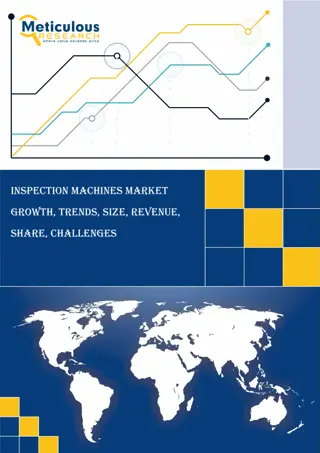
![Halal_Chicken_from_Brazil-_Ensuring_Quality_and_Authenticity[1]](/thumb/86918/halal-chicken-from-brazil-ensuring-quality-and-authenticity-1.jpg)
